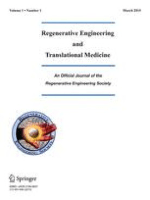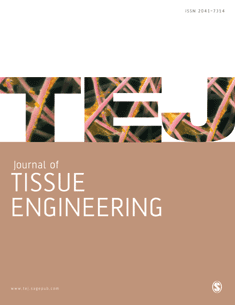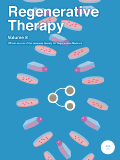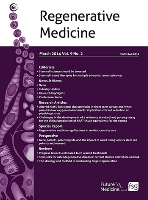
Regenerative Engineering and Translational Medicine
metrics 2024
Empowering Progress in Translational Medicine
Introduction
Regenerative Engineering and Translational Medicine is an esteemed academic journal published by Springer Heidelberg, focusing on the interdisciplinary fields of biomaterials, biomedical engineering, and cell biology. With an ISSN of 2364-4133 and an E-ISSN of 2364-4141, the journal has carved a niche for itself since its inception in 2015, showcasing cutting-edge research that bridges the gap between scientific findings and practical applications in regenerative medicine. As a recognized platform in its field, it is currently positioned within Q3 quartiles in biomaterials, biomedical engineering, and medicine (miscellaneous), with a Scopus ranking that reflects its growing influence among peers. The journal aims to disseminate high-quality, peer-reviewed articles that highlight advancements in regenerative engineering, further advancing both theoretical and applied research. Scholars and practitioners seeking to stay at the forefront of the ever-evolving landscape of regenerative health solutions will find invaluable insights and innovations within these pages. Join a community of leading thinkers and explore the journal's comprehensive research contributions, which are crucial for fostering partnerships between academia and industry in the quest for transformative medical solutions.
Metrics 2024
 0.49
0.49 2.20
2.20 2.40
2.40 24
24Metrics History
Rank 2024
Scopus
IF (Web Of Science)
JCI (Web Of Science)
Quartile History
Similar Journals

CELL AND TISSUE BANKING
Unveiling breakthroughs in cell and tissue preservation.CELL AND TISSUE BANKING, published by Springer, is a prominent journal dedicated to advancing the fields of biomaterials, biomedical engineering, cell biology, and transplantation. With its ISSN 1389-9333 and E-ISSN 1573-6814, the journal plays a crucial role in disseminating high-quality research from its inception in 2000 to its ongoing contributions through 2024. Situated in the Netherlands, it boasts a respectable 2023 impact factor with notable quartile rankings, positioning it within the Q3 category for biomaterials, biomedical engineering, and transplantation, and Q4 for cell biology. Furthermore, its Scopus rankings underscore its relevance and influence, particularly in the fields of medicine and engineering. Although it does not currently offer open access options, the journal remains a vital resource for researchers, professionals, and students alike, fostering innovation and knowledge transfer in the critical areas of cell and tissue sustainability.

Inflammation and Regeneration
Connecting researchers to the latest in inflammation and regeneration.Inflammation and Regeneration is a prominent open-access journal published by BMC, focused on the discerning fields of immunology, cell biology, and regenerative medicine. Since its establishment in 2016, the journal has provided a platform for the dissemination of high-quality research, contributing significantly to the advancement of knowledge in inflammation processes and regenerative therapies. With a remarkable impact reflected in its Q1 quartile rankings in Cell Biology and Immunology for 2023, Inflammation and Regeneration stands out as a leading resource for researchers and practitioners. The journal's commitment to open access ensures that critical findings are readily available to a global audience, fostering collaboration and innovation in the scientific community. With a Scopus ranking that places it in the top 20% of its categories, Inflammation and Regeneration serves as an essential reference for those seeking to stay at the forefront of immunological research and its applications.

Biofabrication
Exploring Breakthroughs in Biofabrication Research.Biofabrication, published by IOP Publishing Ltd, stands at the forefront of the interdisciplinary fields of biochemistry, bioengineering, biomaterials, biomedical engineering, biotechnology, and miscellaneous medicine. Since its inception in 2009, this prestigious journal has secured its position within the Q1 category across multiple disciplines as of 2023, reflecting its high impact and significant contribution to advancing research in these domains. With ranks such as #19 in biochemistry and #10 in biomaterials according to Scopus, it showcases groundbreaking studies and innovative methodologies that are crucial for the evolution of biofabrication technologies. Authored by leading researchers and professionals, the journal publishes articles that explore the synthesis, characterization, and application of biomaterials, providing valuable insights for both academic researchers and industry practitioners. The impact factor of the journal, combined with its rigorous peer-review process, guarantees high-quality content that pushes the boundaries of knowledge and technology. Researchers and students engaged in these dynamic fields will find Biofabrication an indispensable resource for staying abreast of critical developments and emerging trends.

Current Stem Cell Research & Therapy
Exploring Innovative Therapies for Tomorrow's MedicineCurrent Stem Cell Research & Therapy, published by Bentham Science Publishers Ltd, is a leading journal dedicated to advancing the field of stem cell research. With an ISSN of 1574-888X and an E-ISSN of 2212-3946, this journal has been a valuable resource since its inception in 2006 and continues to broaden its scope through 2024. Recognized in the Q2 quartile for Medicine (miscellaneous) and ranked in the 66th percentile among its peers, the journal plays a crucial role in disseminating high-quality, peer-reviewed research that explores both the therapeutic and biological implications of stem cells. Located in the United Arab Emirates, Current Stem Cell Research & Therapy embraces a global audience of researchers, professionals, and students, providing a vibrant platform for discourse and innovation. While the journal offers subscription-based access, it remains committed to enhancing the scientific community's understanding of stem cell therapy and its applications across various medical fields.

Cellular and Molecular Bioengineering
Unleashing Potential: Where Molecular Biology Meets EngineeringCellular and Molecular Bioengineering, published by SPRINGER, is a prominent journal dedicated to the exploration of interdisciplinary approaches in the fields of biochemistry, genetics, and molecular biology. With an ISSN of 1865-5025 and an E-ISSN of 1865-5033, this journal has been a pivotal resource since its inception in 2009, showcasing groundbreaking research that combines innovative modeling and simulation techniques with cellular and molecular applications. As a Q2 journal in both Biochemistry, Genetics and Molecular Biology (miscellaneous) and Modeling and Simulation categories, it ranks favorably in the Scopus metrics, placing 62nd out of 324 in Mathematics_ Modeling and Simulation, and 69th out of 221 in General Biochemistry, Genetics and Molecular Biology. The journal's commitment to quality research and its contribution to advancing academic dialogue make it essential for researchers, professionals, and students seeking to stay at the forefront of bioengineering innovation. While it currently does not offer open access, it continues to provide significant insights and empirical studies that can help shape future developments in the field, reinforcing its role as a key player in cellular and molecular bioengineering.

Journal of Tissue Engineering
Advancing Knowledge in Tissue Engineering and BiomedicineThe Journal of Tissue Engineering, published by SAGE Publications Inc., stands at the forefront of innovation in the interdisciplinary fields of biomaterials and biomedical engineering. Established as an open access journal since 2010, it has quickly ascended to a leading position, as evidenced by its impressive rankings in 2023: Q1 in Biomaterials, Q1 in Biomedical Engineering, and Q1 in Medicine (miscellaneous). With a current impact factor that underscores its academic influence, this journal provides a vital platform for researchers, professionals, and students to share groundbreaking discoveries and advancements in tissue engineering and regenerative medicine. Located in the United Kingdom, the journal fosters a global dialogue with its robust publications and rigorous peer-review process, contributing significantly to the enhancement and understanding of complex biological systems. Join the esteemed community of thought leaders and innovators shaping the future of healthcare through the Journal of Tissue Engineering.

Regenerative Therapy
Transforming discoveries into impactful solutions in regenerative medicine.Regenerative Therapy is a premier open-access journal dedicated to advancing the fields of biomaterials, biomedical engineering, and developmental biology. Published by Elsevier in Japan, this journal has been an influential platform since its inception in 2015, contributing significantly to the global discourse on regenerative medicine. With an impressive Q2 ranking in major categories such as Biomaterials and Biomedical Engineering, it is recognized for its quality of research and innovation. Researchers seeking to disseminate their findings or explore cutting-edge developments will find Regenerative Therapy to be invaluable, reflecting current trends and fostering collaborations across interdisciplinary boundaries. The journal offers open access, ensuring that high-quality research is available to a broad audience and enhances the impact of scholarly work in the regenerative medicine community.

Stem Cells and Cloning-Advances and Applications
Pioneering Discoveries in Regenerative MedicineStem Cells and Cloning-Advances and Applications is a leading peer-reviewed journal dedicated to the dynamic fields of stem cell research and cloning technologies. Published by DOVE MEDICAL PRESS LTD in New Zealand since 2008, this Open Access journal ensures that groundbreaking findings are accessible to a global audience. With a focus on innovative applications and advancements in cellular biology, the journal plays a pivotal role in disseminating knowledge within the scientific community. The journal currently holds an impact factor that reflects its influence, with notable rankings in both Cell Biology and Medicine (Miscellaneous), showcasing its interdisciplinary relevance. Researchers, professionals, and students alike benefit from the journal’s wide-ranging contributions, covering critical topics from regenerative medicine to genetic research. With a commitment to fostering collaboration and encouraging discussion in these cutting-edge domains, Stem Cells and Cloning-Advances and Applications continues to be a vital resource for advancing scientific inquiry and application.

Regenerative Medicine
Pioneering Discoveries in Biomedical RegenerationRegenerative Medicine, published by Taylor & Francis Ltd, is a pivotal journal within the field of biomedical research, focusing on the innovative advances in regenerative and restored functions in human health. With an ISSN of 1746-0751 and an E-ISSN of 1746-076X, this esteemed journal boasts a commendable impact factor within its categories, notably holding the Q2 status in Embryology and Q3 in Biomedical Engineering as of 2023. Covering a broad spectrum of topics from stem cell research to tissue engineering, it serves as a crucial platform for interdisciplinary collaboration among researchers, professionals, and students dedicated to the regeneration of tissues and organs. Given its comprehensive scope from 2006 to 2024, the journal continues to attract high-quality manuscripts that advance the frontiers of knowledge in regenerative medicine. Researchers and practitioners alike are encouraged to engage with the latest findings and methodologies disseminated in this vital publication.

BIOCELL
Advancing the Frontiers of Cell BiologyBIOCELL is a distinguished peer-reviewed journal dedicated to the field of Cell Biology, published by TECH SCIENCE PRESS. Since its inception in 1995, the journal has been at the forefront of disseminating innovative research, with converged publication years extending from 1995 to 2013 and from 2015 to 2024. Although it currently holds a Q4 ranking in the Cell Biology category according to the 2023 category quartiles, BIOCELL aims to foster advancements by providing a platform for researchers, professionals, and students to share their findings in biochemistry, genetics, and molecular biology. The journal is available in both print (ISSN: 0327-9545) and digital formats (E-ISSN: 1667-5746) and seeks to attract contributions that enhance scholarly dialogue and understandings of cellular mechanisms and innovations. With a commitment to quality research and critical discourse, BIOCELL plays an important role in nurturing the scientific community within Argentina and beyond, offering vital insights that contribute to the advancement of the life sciences.